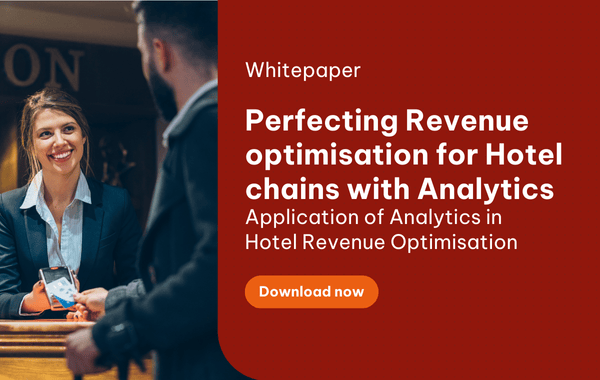For a hotel chain, which may own, operate or manage thousands of properties around the world, revenue management truly is a daunting challenge. In recent years, many hotel chains have heavily invested in Business Intelligence (BI) to drive their revenue management. The massively powerful data analytics capabilities provided by Business Intelligence solutions have created giant leaps in revenue optimisation of hotel chains.

Data Analytics and the Hospitality industry
The hotel industry is among industries poised to benefit greatly from data analytics. Hotel chains can tap into a wide variety of data sets: external vs. internal, structured vs. unstructured.
External data comes from other parties outside the hotel chain, such as weather, economic factors, traffic, and trends in the social media. Internal data is generated by the hotel chain’s systems and functions like bookings, PMS (Property management system), front office, back office, and sales and marketing.
Structured data is organised and can easily be sorted or filtered. A spreadsheet containing guests’ names, countries, dates of arrival and departure is a typical example of structured data. On the other hand, reviews on websites like Expedia, Agoda or TripAdvisor can be considered unstructured data.
Read more: [Infographic] Hospitality trends to look for in 2017
Regardless of its sources and formats, data can be analysed and acted upon accordingly to provide impactful improvements in revenue optimisation. In the next section, we will examine how hotel chains around the world have been benefiting from analytics.
Harnessing the power of Analytics
Starwood Hotels and Resorts, which owns, operates and manages nearly 1,300 properties around the world, heavily relies on data analytics to optimise room pricing. They even go as far as analysing data on the weather forecast in the US to predict demand for Caribbean trips. The investment in BI is believed to help increase their revenue-per-room by 5 percent[1].
The US-based economy hotel chain Red Roof Inn manages a number of hotels near key airports. A few years ago, they ran a campaign that specifically targeted passengers whose flights were cancelled. The company’s analytics team utilised multiple public data sources on weather conditions and flight cancellations to forecast demand for hotel accommodation. And because most stranded passengers would search for accommodation on their mobile devices, Red Roof used that information for mobile marketing activities in specific areas. This campaign led to a 10 percent increase in revenue in areas where it was implemented[2].
It should be noted that applying data analytics in revenue optimisation is not limited to large chains only. The family-owned Denihan Hospitality Group, whose upscale boutique hotels are located mostly in New York and several other US urban markets, is another hotel chain that takes BI very seriously. They consider analytics and information one of their competitive edges and even appoint one Vice President for Business Intelligence. Their BI efforts focus on anticipatory dashboards and reports which allow top executives to access strategic information without excessive details[3].
As a result of such strategic information, Denihan’s hotels were able to run at 200 percent of the average bookings rate of other competitors during a recent peak demand period in Manhattan. The company also reported an impressive 300 percent ROI of the investment in analytics software. On top of that, the internal benefits of analytics are immense. Denihan’s revenue management team has achieved 40 percent increase in productivity.
Read more: 9 ways to increase Hotel Profits
Enterprise-wide Business Intelligence deployment
Analytics has revolutionised the way Hotel chains around the world optimise their revenues. And by doing so, they not only increase revenues but also significantly enhance relationships within the entire chain. The potential impact of analytics on other aspects of the hospitality industry is also enormous.
The ultimate goal is enterprise-wide Business Intelligence deployment. Besides the revenue optimisation team, every other function should be armed with analytics capability. Marketing, Operations, Investment, or CRM can all benefit from a fully-embedded Business Intelligence system.
An enterprise-wide BI system should also be a self-service solution. That is, in addition to skilled analysts, any staff can use the system with some training to answer their own questions.
As hotel companies continue to invest in Business Intelligence solutions, it is worth noting that technology alone is not enough. Successful analytics implementation also requires people with analytical skills and appropriate processes in place to turn insights and recommendations into real results.
Read more: Improving financial forecasting for hotels with cloud-based systems
For more information about the benefits of Business Intelligence for the Hospitality industry, please download the following whitepaper.
[1&2] Source: www.forbes.com/sites/bernardmarr/2016/01/26/how-big-data-and-analytics-changing-hotels-and-the-hospitality-industry
[3] Source: www.kdnuggets.com/2015/09/big-data-analytics-hotel-industry
 English
English  Vietnamese
Vietnamese 


